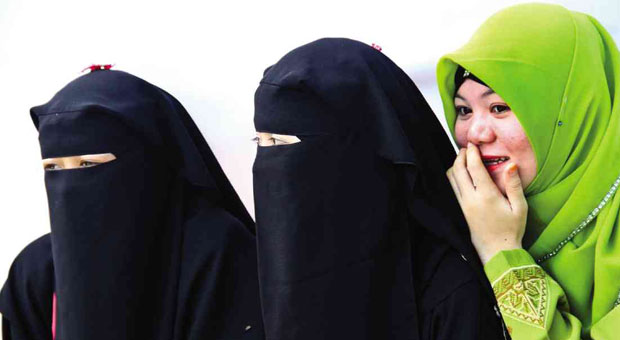‘Sharia doesn’t ask women to cover face, hands or feet’
Pakistan’s Council of Islamic Ideology (CII) continued its tradition of focusing on issues concerning women at its 200th meeting, on Monday.
The meeting, chaired by Maulana Mohammad Khan Sherani, ruled that covering the face, the hands up to the wrists and feet was not mandatory for Muslim women.
Incidentally, some of the more liberal members of the CII, including Maulana Tahir Ashrafi and Allama Amin Shaheedi, did not attend the first sitting of the two-day meeting.
The session was attended, among others, by Dr Samia Raheel Qazi of Jamaat-i-Islami. The ruling was strongly supported by Samia, despite the fact that she wears a niqab.
Maulana Sherani, who belongs to the JUI-F, also supported niqab for Muslim women to cover their face and preferably gloves and socks to cover their hands and feet.
Article continues after this advertisementTalking to the media after the meeting, Maulana Sherani said there was no law in Sharia binding women to cover their face, feet or hands up to the wrist.
Article continues after this advertisement“Covering the face and other parts of the body is not mandatory. But still it is good to follow ethics and have a careful attitude in society,” he said.
“But at the same time, it is necessary to cover the face and adopt complete covering attire if there are threats of mischief.”
Maulana Sherani, however, did not elaborate on what he meant by ‘threat’ and ‘mischief’.
While the CII has focused on several issues revolving around girls and women, this was the first time that it took up a matter related to the Sharia interpretation of veil (purdah).
But an official of the CII disclosed that the matter was taken up on the request of the interior ministry as many communities and clerics were still opposing the requirement of women to be photographed for computerized national identity cards (CNIC).
“We have heard that some families are not getting their women registered with Nadra only due to the photo issue,” the official said.
A Nadra official added that due to the prevailing law and order situation in the country, getting a photo identity had become mandatory.
Apart from the Sharia description of the veil, the CII reiterated its old stance against co-education and described it as an unhealthy practice for society.
It ruled that education should be imparted to boys and girls separately, even at the early levels.
However, the CII also spoke for the rights of transvestites and criticized the families who discarded such children or left them without inheritance.
In the end, Maulana Sherani stressed the need for maintaining peace during Muharram.
“We all should observe the sanctity of this month,” he added.
Under the law, rulings and observations of the CII are not binding on the parliament or the government. But all the functions of the government and enactments of laws have to be vetted by the CII to ensure that they are not contrary to the teachings of Islam.
